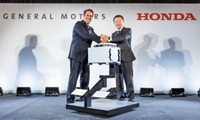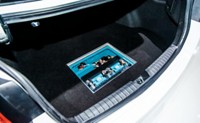Advertisement
Grab your lab coat. Let's get started
Welcome!
Welcome!
Create an account below to get 6 C&EN articles per month, receive newsletters and more - all free.
It seems this is your first time logging in online. Please enter the following information to continue.
As an ACS member you automatically get access to this site. All we need is few more details to create your reading experience.
Not you? Sign in with a different account.
Not you? Sign in with a different account.
ERROR 1
ERROR 1
ERROR 2
ERROR 2
ERROR 2
ERROR 2
ERROR 2
Password and Confirm password must match.
If you have an ACS member number, please enter it here so we can link this account to your membership. (optional)
ERROR 2
ACS values your privacy. By submitting your information, you are gaining access to C&EN and subscribing to our weekly newsletter. We use the information you provide to make your reading experience better, and we will never sell your data to third party members.
Business
Toyota Frees Fuel-Cell Patents
Transportation: Automaker says move will hasten development of hydrogen-powered vehicles
by Melody M. Bomgardner
January 12, 2015
| A version of this story appeared in
Volume 93, Issue 2

In a move to spur development and adoption of hydrogen-fuel-cell transportation, Toyota says it will make thousands of its own patents available for free to other automakers, fuel-cell parts suppliers, and fueling station companies. Toyota’s first consumer fuel-cell car, the Mirai, will go on sale this year.
Successful launch of a first generation of fuel-cell automobiles will require “unconventional collaboration between automakers, government regulators, academia, and energy providers,” said Bob Carter, senior vice president of automotive operations at Toyota Motor Sales U.S.A., when he announced the initiative at last week’s Consumer Electronics Show in Las Vegas. “By eliminating traditional corporate boundaries, we can speed the development of new technologies.”
Toyota owns 5,680 fuel-cell-related patents covering fuel-cell stacks, high-pressure hydrogen tanks, system control software, and hydrogen production and supply.
Similarly, Tesla CEO Elon Musk said last June that the electric car industry would benefit from a common technology platform. “Our true competition is not the small trickle of non-Tesla electric cars being produced,” Musk said, “but rather the enormous flood of gasoline cars pouring out of the world’s factories every day.”
If Toyota entices other automakers to make and sell fuel-cell cars, then governments and other stakeholders may have to deploy hydrogen fueling infrastructure, points out Cosmin Laslau of Lux Research. “However, releasing the patents only helps to a certain extent,” he cautions. “There’s a lot of proprietary know-how behind how to effectively apply the patents that other manufacturers will have to learn the hard way.”
The technological complexity of fuel-cell cars has already inspired cooperation among automakers. Toyota has partnered with BMW; Nissan, Daimler, and Ford have teamed up; and Honda and General Motors have combined their fuel-cell efforts.




Join the conversation
Contact the reporter
Submit a Letter to the Editor for publication
Engage with us on Twitter